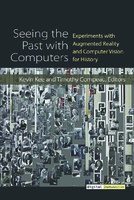Seeing the Past with Computers: Experiments with Augmented Reality and Computer Vision for History
External Review of Whole Manuscript
Author(s)
Kee, Kevin
Compeau, Timothy
Language
EnglishAbstract
Recent developments in computer technology are providing historians with new ways to see—and seek to hear, touch, or smell—traces of the past. Place-based augmented reality applications are an increasingly common feature at heritage sites and museums, allowing historians to create immersive, multifaceted learning experiences. Now that computer vision can be directed at the past, research involving thousands of images can recreate lost or destroyed objects or environments, and discern patterns in vast datasets that could not be perceived by the naked eye. Seeing the Past with Computers is a collection of twelve thought-pieces on the current and potential uses of augmented reality and computer vision in historical research, teaching, and presentation. The experts gathered here reflect upon their experiences working with new technologies, share their ideas for best practices, and assess the implications of—and imagine future possibilities for—new methods of historical study. Among the experimental topics they explore are the use of augmented reality that empowers students to challenge the presentation of historical material in their textbooks; the application of seeing computers to unlock unusual cultural knowledge, such as the secrets of vaudevillian stage magic; hacking facial recognition technology to reveal victims of racism in a century-old Australian archive; and rebuilding the soundscape of an Iron Age village with aural augmented reality. This volume is a valuable resource for scholars and students of history and the digital humanities more broadly. It will inspire them to apply innovative methods to open new paths for conducting and sharing their own research.
Keywords
Media; TextbookDOI
10.3998/mpub.9964786ISBN
9780472131112OCN
1051778444Publisher
University of Michigan PressPublisher website
https://www.press.umich.edu/Publication date and place
Ann Arbor, 2019Series
Digital Humanities,Classification
Information technology: general topics
Graphical and digital media applications


 Download
Download Web Shop
Web Shop